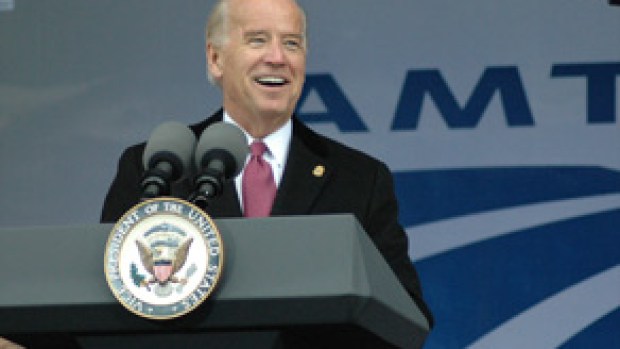Joe Biden is the first president in U.S. history who's lost a child and a spouse to our national traffic violence epidemic.
Though he's far from the only resident of the Oval Office who's life has been forever shaped by the loss of a loved one on our streets — Obama and Clinton both lost their fathers in car crashes, too — Biden may have been uniquely influenced by the experience of grieving his wife and daughter just as he embarked on what would become a decades-long political career.
After all, Biden's first wife, 30 year-old Neilia Biden, and his eldest daughter, 1-year-old Naomi, were both killed by the driver of a tractor-trailer just 16 days before Joe was sworn in for his first term as a senator from Delaware. Unlike today's ceremonious inauguration, that unconventional ceremony was held at the hospital where the couple's two sons, Hunter and Beau, were still recovering from the same crash. Biden would go on to take a 90-minute Amtrak journey home from Washington to put the boys to bed each night, breaking with his fellow Senators who usually maintained second residences in the capitol to which they drove at the end of the day.
He would continue to make that journey for the next 36 years, earning him the nickname Amtrak Joe and a reputation as a rare politician who appreciated the inherent dangers of car dependency, deliberately choosing a mode that was far more likely to get him home to his family safely.
Biden visits his late wife and baby's grave on 48th death anniversary https://t.co/w9KJL3IrEC
— KRON4 News (@kron4news) December 19, 2020
Biden initially planned to make the same Amtrak journey for today's inauguration, too, before a violent White supremacist insurrection at the Capitol raised assassination fears and the train was swapped for an armored motorcade (the SUV motorcade being the main form of transportation among the political elite in D.C., regardless of the moment's specific security concerns.)
Nothing in today's ceremonies referenced President Biden's long history of loss, or how he will reform transportation in America to prevent any other families from enduring a similar tragedy. And during his presidential campaign, Biden was largely silent on how he would use the powers of his office to stop the roadway death toll, focusing instead on what some safe streets advocates considered a confusing mix of big investment in public transportation and big investment in electric cars that tracks closely with establishment Democrats' platform of curbing climate change without aggressively reducing car dependency, which experts say is not possible.
But once his cabinet picks began to trickle out, advocates began to wonder whether the president-elect's platform was a bit more progressive than it first seemed. Biden's pick for Secretary of Transportation, former South Bend Mayor Pete Buttigieg, was the only presidential hopeful to propose a national Vision Zero goal to end traffic violence deaths in the United States. His pick for Deputy Secretary of the department, former New York DOT Commissioner Polly Trottenberg, was even heralded by Biden himself for her leadership in implementing "the nation’s first Vision Zero program, taking a multi-disciplinary approach to eliminating traffic fatalities and injuries."
Biden's not quite right here — Chicago was actually the first U.S. city to commit to a Vision Zero goal in 2012, two years before the Big Apple — but Trottenberg is undoubtedly one of the handful of U.S. transportation officials with the most long-term experience in implementing the life-saving strategy, even if her administration has sometimes stumbled in its path to executing it. Advocates seized on the news of both appointments as a hopeful sign that the Biden administration at large would take the traffic violence epidemic seriously — and take unprecedented federal action to reverse it.
“As individuals who have also been personally impacted by traffic violence, our members across the country are counting on President Biden to help prevent the needless suffering that he too has personally experienced," said Amy Cohen, co-founder of Families for Safe Streets. "Our country needs a leader to help us end this devastating preventable public health crisis. We are encouraged by the signs already being made by the incoming administration and are counting on President Biden and the nominees to lead USDOT, including Pete Buttigieg and Polly Trottenberg, to deliver proven solutions which will make our streets safe for everyone.”
To date, no U.S. president has been nearly aggressive enough on delivering those proven solution. Pedestrian deaths are a staggering 51 percent higher today than the last time Biden held office in the White House as Vice President in 2009. The path to reversing that trend will take an astounding confluence of courageous policies that will disrupt structures of power and profit to reshape American life forever.
But to quote Biden himself in his 2008 remarks to the Democratic National Convention, "Failure at some point in your life is inevitable, but giving up is unforgivable." As Biden knows better than almost anyone, it would be stunningly easy to give into almost a century of collective grief and delude ourselves into believing that the war to end roadway fatalities simply can't be won. To do the opposite, though, could give our 46th president an extraordinary legacy: the first President in U.S. history to take visionary action to end the most enduring public health crisis of the modern era.






